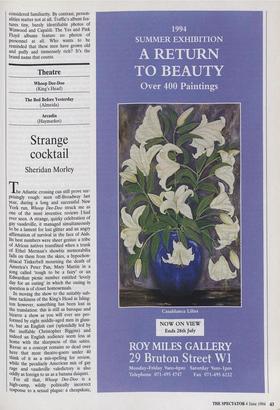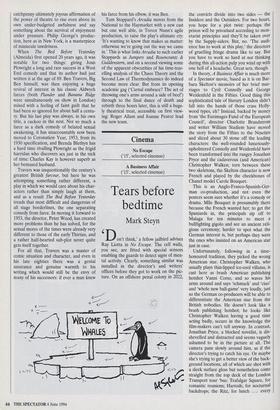Theatre
Whoop Dee-Doo (King's Head) The Bed Before Yesterday (Almeida) Arcadia (Haymarket)
Strange cocktail
Sheridan Morley
he Atlantic crossing can still prove sur- prisingly rough: seen off-Broadway last year, during a long and successful New York run, Whoop Dee-Doo struck me as one of the most inventive reviews I had ever seen. A strange, quirky celebration of gay vaudeville, it managed simultaneously to be a lament for lost glitter and an angry affirmation of survival in the face of Aids. Its best numbers were sheer genius: a tribe of African natives transfixed when a trunk of Ethel Merman's showbiz memorabilia falls on them from the skies, a hypochon- driacal Tinkerbell mourning the death of America's Peter Pan, Mary Martin in a song called 'tough to be a fairy' or an Edwardian picnic number entitled 'lovely day for an outing' in which the outing in question is of closet homosexuals.
In moving the show to the suitably sub- lime tackiness of the King's Head in Isling- ton however, something has been lost in the translation: this is still as baroque and bizarre a show as you will ever see per- formed by eight middle-aged men in glass- es, but an English cast (splendidly led by the ineffable Christopher Biggins) and Indeed an English audience seem less at home with the sharpness of this satire. Revue as a concept remains so dead over here that most theatre-goers under 40 think of it as a mis-spelling for review, while the peculiarly American mix of gay rage and vaudeville valedictory is also oddly as foreign to us as a banana daiquiri.
For all that, Whoop Dee-Doo is a high-camp, wildly politically incorrect response to a sexual plague: a cheapskate, catchpenny ultimately joyous affirmation of the power of theatre to rise even above its own under-budgeted awfulness and say something about the survival of enjoyment under pressure. Philip George's produc- tion, here as in New York, is a masterpiece of miniscule tawdriness.
When The Bed Before Yesterday (Almeida) first opened 20 years ago, it was notable for two things: giving Joan Plowright a long and rare success in a West End comedy and that its author had just written it at the age of 89. Ben Travers, Big Ben himself, was then enjoying a huge revival of interest in his classic Aldwych farces (both Plunder and Banana Ridge were simultaneously on show in London) mixed with a feeling of faint guilt that he had been so ignored for about half a centu- ry. But his last play was always, in his own title, a cuckoo in the nest. Not so much a farce as a dark comedy of belated sexual awakening, it has unaccountably now been moved to Coronation Year, 1953, from its 1930 specification, and Brenda Blethyn has a hard time rivalling Plowright as the frigid harridan who discovers sex just in the nick of time: Charles Kay is however superb as her bemused husband.
Travers was unquestionably the century's greatest British farceur, but here he was attempting something rather different, a play in which we would care about his char- acters rather than simply laugh at them, and as a result The Bed Before Yesterday treads that most difficult and dangerous of all stage borderlines, the one separating comedy from farce. In moving it forward to 1953, the director, Peter Wood, has created more problems than he has solved, for the sexual mores of the times were already very different to those of the early Thirties, and a rather half-hearted sub-plot never quite gets itself together.
For all that, Travers was a master of comic situation and character, and even in his late eighties there was a genial assurance and genuine warmth to his writing which would still be the envy of many of his successors: if ever a man knew his farce from his elbow, it was Ben.
Tom Stoppard's Arcadia moves from the National to the Haymarket with a new cast but one well able, in Trevor Nunn's agile production, to raise the play's ultimate cry: `It's wanting to know that makes us matter: otherwise we're going out the way we came in.' This is what links Arcadia to such earlier Stoppards as Jumpers and Rosencrantz & Guildenstern, and on a second viewing some of the apparent obscurities of his time-trav- elling analysis of the Chaos Theory and the Second Law of Thermodynamics do indeed become more clear. But from its opening academic gag (`Carnal embrace? The act of throwing one's arms around a side of beef) through to the final dance of death and rebirth three hours later, this is still a huge- ly theatrical treat, accessible on first view- ing: Roger Allam and Joanne Pearce lead the new team.



























































 Previous page
Previous page